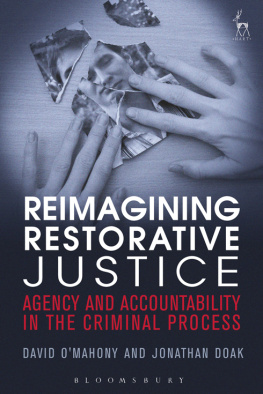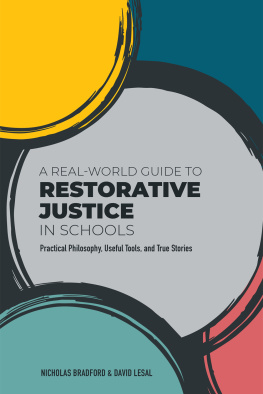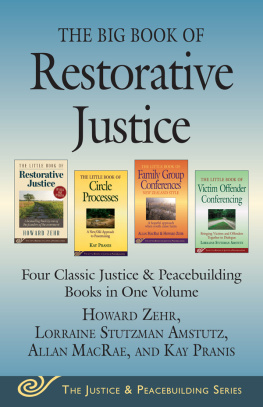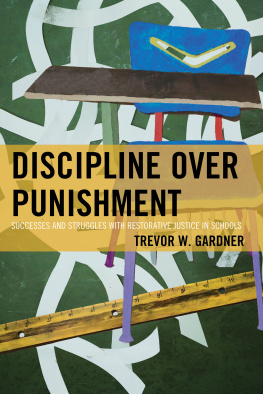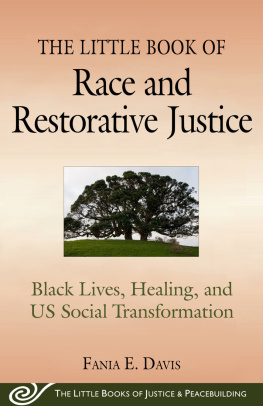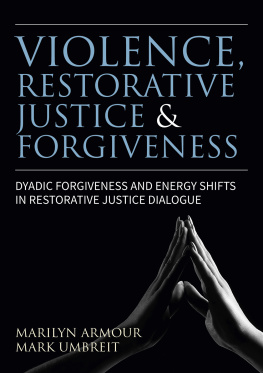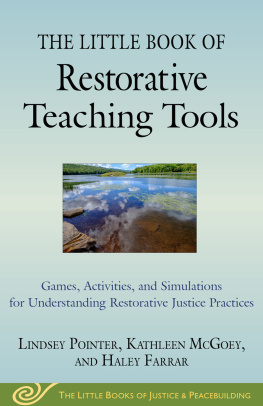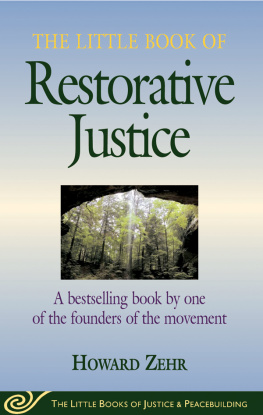Table of Contents

REIMAGINING RESTORATIVE JUSTICE
In recent years, restorative-based interventions have expanded rapidly and are increasingly viewed as a legitimate, and even superior means of delivering justice. The result of this swift but piecemeal development has been that restorative justice practice has outpaced the development of restorative justice theory. This book takes up this challenge by reimagining a new framework for the operation of restorative justice within criminal justice. In essence, it is contended that the core empowering values of agency and accountability provide a lens for reimagining how restorative justice works and the normative goals it ought to encompass.
Reimagining Restorative
Justice
Agency and Accountability in the
Criminal Process
David OMahony and Jonathan Doak

OXFORD AND PORTLAND, OREGON
2017
Hart Publishing
An imprint of Bloomsbury Publishing Plc
Hart Publishing Ltd Kemp House Chawley Park Cumnor Hill Oxford OX2 9PH UK | Bloomsbury Publishing Plc 50 Bedford Square London WC1B 3DP UK |
www.hartpub.co.uk
www.bloomsbury.com
Published in North America (US and Canada) by
Hart Publishing
c/o International Specialized Book Services
920 NE 58th Avenue, Suite 300
Portland, OR 97213-3786
USA
www.isbs.com
HART PUBLISHING, the Hart/Stag logo, BLOOMSBURY and the
Diana logo are trademarks of Bloomsbury Publishing Plc
First published 2017
David OMahony and Jonathan Doak 2017
David OMahony and Jonathan Doak have asserted their right under the Copyright,
Designs and Patents Act 1988 to be identified as Authors of this work.
All rights reserved. No part of this publication may be reproduced or transmitted in any form or by any
means, electronic or mechanical, including photocopying, recording, or any information
storage or retrieval system, without prior permission in writing from the publishers.
While every care has been taken to ensure the accuracy of this work, no responsibility for loss or damage
occasioned to any person acting or refraining from action as a result of any statement
in it can be accepted by the authors, editors or publishers.
All UK Government legislation and other public sector information used in the work is Crown Copyright .
All House of Lords and House of Commons information used in the work is Parliamentary Copyright .
This information is reused under the terms of the Open Government Licence v3.0 (http://www.
nationalarchives.gov.uk/doc/open-government-licence/version/3) except where otherwise stated.
All Eur-lex material used in the work is European Union, http://eur-lex.europa.eu/, 19982017.
British Library Cataloguing-in-Publication Data
A catalogue record for this book is available from the British Library.
ISBN:PB:978-1-84946-056-9
ePDF:978-1-50990-106-7
ePub:978-1-78225-197-2
Library of Congress Cataloging-in-Publication Data
Names: OMahony, David. | Doak, Jonathan.
Title: Reimagining restorative justice : agency and accountability in the criminal process /
David OMahony and Jonathan Doak.
Description: Oxford ; Portland, Oregon : Hart Publishing, an imprint of Bloomsbury Publishing Plc, 2017. |
Includes bibliographical references and index.
Identifiers: LCCN 2017021992 (print) | LCCN 2017025881 (ebook) |
ISBN 9781782251972 (Epub) | ISBN 9781849460569 (pbk. : alk. paper)
Subjects: LCSH: Restorative justice. | Criminal justice, Administration of.
Classification: LCC HV8688 (ebook) | LCC HV8688 .O425 2017 (print) | DDC 364.6/8dc23
LC record available at https://lccn.loc.gov/2017021992
Typeset by Compuscript Ltd, Shannon
To find out more about our authors and books visit www.hartpublishing.co.uk. Here you will find extracts,
author information, details of forthcoming events and the option to sign up for our newsletters.
This book proposes a new theoretical lens through which the theory and practice of restorative justice can be analysed. Given the sheer pace of recent developments in the field, there has been a clear need to re-evaluate the utility of some of the prevailing benchmark theories and to reimagine the shape and role of theory in guiding restorative justice provision within criminal justice. Drawing on empowerment theory, we argue that the joint concepts agency and accountability (which we label the agency-accountability framework) provide a useful lens for reimagining how restorative justice works and the normative goals it ought to encompass. From our perspective, programmes which aspire to be regarded as fully restorative should be designed, implemented and evaluated in such a way that agency and accountability are maximised.
The genesis of this book began some years ago, when we led a major evaluation of the newly mainstreamed restorative conferencing system in Northern Ireland following the ceasefires and peace agreement. Shortly after, we were commissioned to undertake an international review of restorative justice for the National Commission of Restorative Justice in Ireland. These projectswhile valuable in their own rightprompted a myriad of questions concerning the lack of coherence in restorative justice theory, and how this could be married to the highly divergent range of practices that have emerged in recent years on a transnational basis. Whilst we cannot claim that the book offers definitive answers to the many conundrums regarding the role of restorative justice within criminal justice, it is hoped that the book will provide a useful contribution to ongoing debates about the values and practices which underpin contemporary criminal processes.
We would like to extend our sincere gratitude to a number of individuals who have (perhaps unwittingly) assisted us in developing and refining our ideas. Valuable insights were offered by participants at various conference sessionsmost notably at meetings of the European Society of Criminology and the Restorative Justice and Mediation in Penal Matters project at the University of Greifswald. Three previous conferences around the theme of bridging theory and practice in restorative justice, hosted by Durham Law School and Nottingham Law School also generated many fruitful discussions. Particularly constructive questions and comments were offered inter alia by Tim Chapman, Frieder Dnkel, Simon Green, Kerry Clamp and Joanna Shapland. The excellent work of our former doctoral students at Durham University, Adeniyi Olayode, Kelly Stockdale and Elizabeth Tiarks, also provided us with valuable food for thought as they progressed through their own academic journeys. Colleagues at the Universities of Durham, Essex and Nottingham Trent have also provided helpful insights and encouragement. Particular thanks are owed to Lorna Fox OMahony who read and provided useful feedback on previous drafts of our work, and to Emily Braggins and the rest of the team at Hart. Our copyeditor, Ceri Warner, also provided excellent support in pulling the final draft together. Any errors or omissions remain our own.
Finally, we are indebted to our familiesLorna, Conor, Aidan and Benji (David) and Lauran, Miriam, Reuben and Benji (Jonathan)for their love and support throughout this project. We dedicate this book to them.
David OMahony and Jonathan Doak

